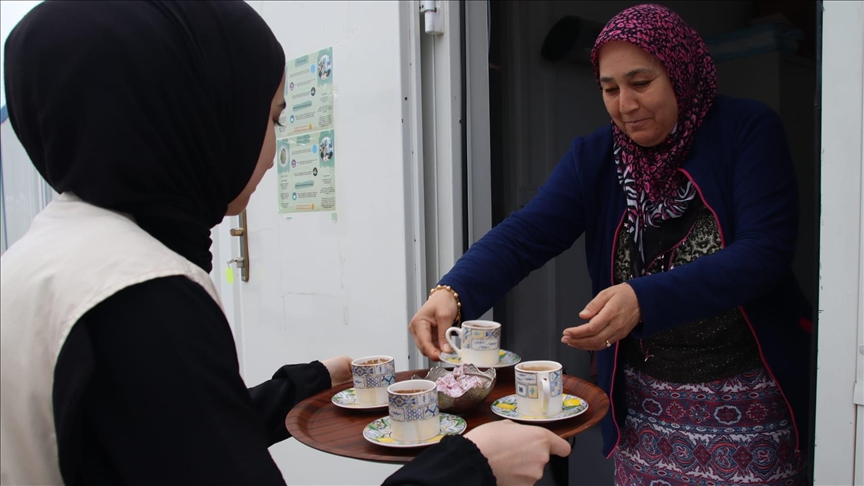GAZIANTEP, Türkiye
The scent of freshly brewed coffee wafting through the air has brought a smile to the face of many residents of camps set up in southern Türkiye for the victims of massive earthquakes that struck the region last month, forcing millions to start life from scratch.
Basic food and shelter have become the top priority in the large tent and container camps that now dot the region, stretching across 11 provinces where the 7.7 and 7.6 magnitude tremors hit hardest, costing over 50,000 lives.
For most residents, this has meant leaving behind nearly all their small routine pleasures, including Turkish coffee, a cornerstone for many households prepared for special occasions and day-to-day relaxation alike.
In the hopes of providing a glimmer of normalcy in the bleak surroundings, a group of women from across the country went to the earthquake zone to serve survivors a comforting cup of coffee.
This was the first sip of the beverage that many of the survivors tasted since the twin earthquakes, prepared by the women on stands amid the temporary shelters since the 20th day of the earthquakes in provinces including Adiyaman and Gaziantep.
The volunteer group, brought together by a social media movement called the Human Movie Team, hoped to bring back at least one part of the daily routines of those affected by the disaster.
And according to the project coordinator Tulay Gokcimen, they were well received by the camp residents.
“‘My greatest pleasure was drinking coffee in front of the TV,’ ‘I came here following the smell of coffee,’ ‘We wouldn’t have been as happy if you had given us meat,’ ‘You came and cheered us up,’ — these are the kind of (comments) we heard while serving coffee,” she said.
Established in 2015, the Human Movie Team comprises women volunteers who seek to support aid campaigns, such as this one, which they have dubbed, “The memory of a cup of coffee lasts 40 years,” a common Turkish proverb.
“When people first saw coffee being served, they were always surprised and asked if we were really offering coffee. Those who said that they had not had coffee for days were deeply moved by our offer and relived their memories of the time before the earthquake,” Gokcimen said.
The group has so far served coffee to almost 11,000 earthquake victims in Adiyaman, Kahramanmaras, Malatya, and Gaziantep provinces. They plan to continue until victims have been resettled in their permanent residences.
In Turkish society, coffee means a great deal, she explained.
“Coffee means (fond) conversation. Friends drink coffee while chatting. People invite each other to drink coffee to have a heart-to-heart talk. Under the guise of serving coffee, we’re carrying out this project for conversation and healing souls.”
Embraced with happiness
Semanur Yontan, another member of the team who made coffee for people at a camp in Gaziantep for two days, expressed how happy she was to be a part of the project.
“I never imagined that someone would embrace me for serving them coffee, but it happened there. It turns out that we’ve given a lot of meaning to coffee and Turkish coffee has such a special and beautiful place in our routine lives,” Yontan said.
Coffee culture is important in Turkish society. Among the various brewing methods, Turkish coffee is one of the oldest and most well-known.
The roots of Turkish coffee culture and tradition can be traced back to the 16th century, a time when coffeehouses in Istanbul began serving the beverage.
“Turkish Coffee is not only a beverage but also a communal practice that brings together cultural spaces, social values and beliefs within a context of the socialization process. Its role in socialization can be traced back to the opening of the first coffeehouses with its noticeable decorations in Istanbul,” according to an article by the Turkish Ministry of Culture and Tourism.
Turkish coffee was even added to UNESCO’s list of Intangible Cultural Heritage of Humanity on Dec. 5, 2013. Since then, World Turkish Coffee Day has been celebrated on Dec. 5 every year.
It promotes Türkiye’s 500-year-old coffee culture and its significant historical value while building cultural bonds.
With the beginning of the Muslim holy month of Ramadan in Türkiye this week, Gokcimen said the team would be in Hatay province this weekend to serve coffee from sundown to pre-dawn, when many Muslims take a break from daily fasting throughout the month.

